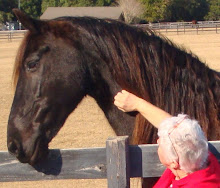
Stream of consciousness thinking: Can we parse theology the same way we parse a sentence? The subject is God; the verb is "is" (from "I am who I am"). Given that statement made to Moses, can we say anything else for certain? I believe that everything else we say is just that: belief. But, isn't most of religion about belief? And, how do we pick and choose from all the different images found in the scriptures about God and in the New Testament about Jesus?
What else would I say to complete the sentence: God is....
- aware
- creative
- will reclaim all of creation not just some of it (universal salvation)
- mostly unknowable
- present
and, I like to think that God is:
- good
- has a sense of humor
- allows us to be co-creators
- all powerful, all good and all knowing (but I have serious doubts about this)
- an intervener in earthly matters
- a user of the willing as instruments of change and intervention
- able to really know every hair on my head (however small they may be now)
- listener of prayers
- expectant of my participation
What I think that God isn't is a much longer list some of which simply contradicts what others may believe/think: God isn't:
- all-knowing, all-powerful, all-good (contradictions in this trilogy)
- concerned with how we worship
- limited by time, space or other constructs of humanity
- going to "rapture" those who believe
So, this is something I will muse on for a few hundred years, but the truth is that I don't know anything about God beyond "God is".








